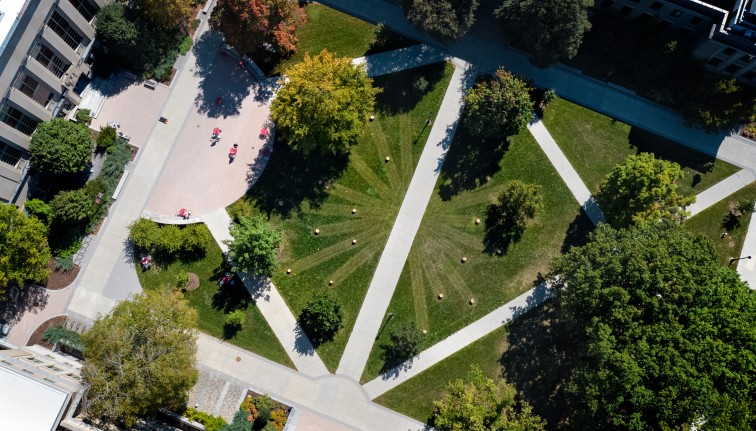Schools & Departments at CALS
Cornell University’s College of Agriculture and Life Sciences is a global leader in agricultural, life, environmental and social sciences.
It fosters a collaborative environment in which faculty, staff and students work together, emphasizing respect, diversity and a commitment to applying knowledge for the public good.
CALS is organized into 14 academic departments and three schools, with programs spanning over 20 majors and 25 minors for undergraduates and 30 graduate fields of study. This structure promotes interdisciplinary collaboration and leverages the expertise of faculty across disciplines.
Explore our degree programs through the CALS Program Finder or contact our schools and academic departments for more information.
14
Departments
3
Schools
20+
Majors
Schools at CALS
Ashley School of Global Development and the Environment
The Ashley School at Cornell CALS is a dynamic hub for addressing complex challenges facing people and the planet in the 21st century. Emphasizing education with impact, we contribute our broad interdisciplinary expertise to pioneer practical solutions, emphasizing real-world engagement with communities in New York state and more than 30 countries around the globe to improve lives and livelihoods and promote environmental stewardship.

School of Integrative Plant Science
The School of Integrative Plant Science is home to five distinct plant science areas that work together to envision solutions to the major challenges of feeding a burgeoning population, mitigating and adapting to climate change and preserving biodiversity and essential ecosystem functions.

Charles H. Dyson School of Applied Economics and Management
With internationally renowned areas of expertise in food and agricultural economics, management, environmental and resource economics, and international and development economics, the Dyson School is perfectly poised to fulfill its core mission: to use business for the greater good.

CALS Academic Departments

The Department of Animal Science works to discover and develop new techniques and information to benefit animals, agriculture and human health through research programs that advance our understanding of animal biology and address local and global issues facing animal industries today.

The Department of Biological and Environmental Engineering is one of the largest of its kind in the country and serves three integrated functions: teaching of undergraduate and graduate students; research on problems in agriculture, biology and the environment; and public outreach to help society implement new knowledge.

The Department of Computational Biology consists of faculty members who apply their expertise in computer science, genomics, systems biology, population genetics and modeling to a wide range of exciting problems in the life sciences.

The Department of Communication is a national leader in the study of communication as a social science and consists of faculty and staff who are dedicated to understanding the role and enhancing the effectiveness of communication processes, systems and infrastructure in society.

The Department of Earth and Atmospheric Sciences is a global leader in research focused on understanding the fundamental processes that have shaped our environment and is committed to providing students with the earth literacy needed to serve as informed citizens and wise stewards of planet Earth.

The Department of Ecology and Evolutionary Biology is a dynamic and friendly place, populated by students, faculty and expert staff who work together to understand the patterns and processes that structure ecological systems, and drive evolutionary change over all time scales.

The Department of Entomology is one of the top-ranked entomology programs in the country with work that spans the globe and impacts human lives on many levels, influencing a broad range of disciplines including human and veterinary medicine, farming, biodiversity and genomics.

As one of the premier food science programs in the nation, the Department of Food Science applies the principles of science and engineering to ensure the nutritional value, safety and quality of foods in the United States and around the globe. The program integrates the disciplines of chemistry, biology, nutrition, physiology, biotechnology and engineering to ensure that all people have access to healthy, affordable food.

The Department of Landscape Architecture is made up of faculty with varied perspectives, research, creative activity and mentoring styles, all of which are intended to challenge students to become responsible, creative designers and to develop innovative, just and sustainable site appropriate responses to critical issues affecting the planet and its inhabitants.

The Department of Microbiology acts as a center for expertise for numerous aspects of microbial biology with research interests in prokaryotic molecular biology and environmental microbiology.

The Department of Molecular Biology and Genetics engages in cutting-edge research, training and teaching to solve basic questions in the life sciences and to apply biological knowledge to critical medical, agricultural and environmental problems.

The Department of Neurobiology and Behavior combines the study of animal behavior with its neural basis, based on the belief that the interface between them is one of great research potential, and has research interests that span all levels of organization, from single neurons to complex circuits to whole organisms and societies thereof.

The Division of Nutritional Sciences embraces theories and methods across many academic disciplines to understand the complex relationships among human health, nutritional status, human genetics, food and lifestyle patterns, social and institutional environments and governmental policies.

The Department of Statistics and Data Science’s academic and research programs take advantage of Cornell University's extensive resources, drawing from many colleges and research groups. Specializations include statistical science, social statistics, and biometry and range from mathematical statistics, computational statistics, and machine learning to the development of statistical methods for astrophysics, ecology, economics, epidemiology, financial modeling, genomics, high dimensional data, neurobiology, legal studies, medicine, public health and risk management.

We openly share valuable knowledge.
Sign up for more insights, discoveries and solutions.


